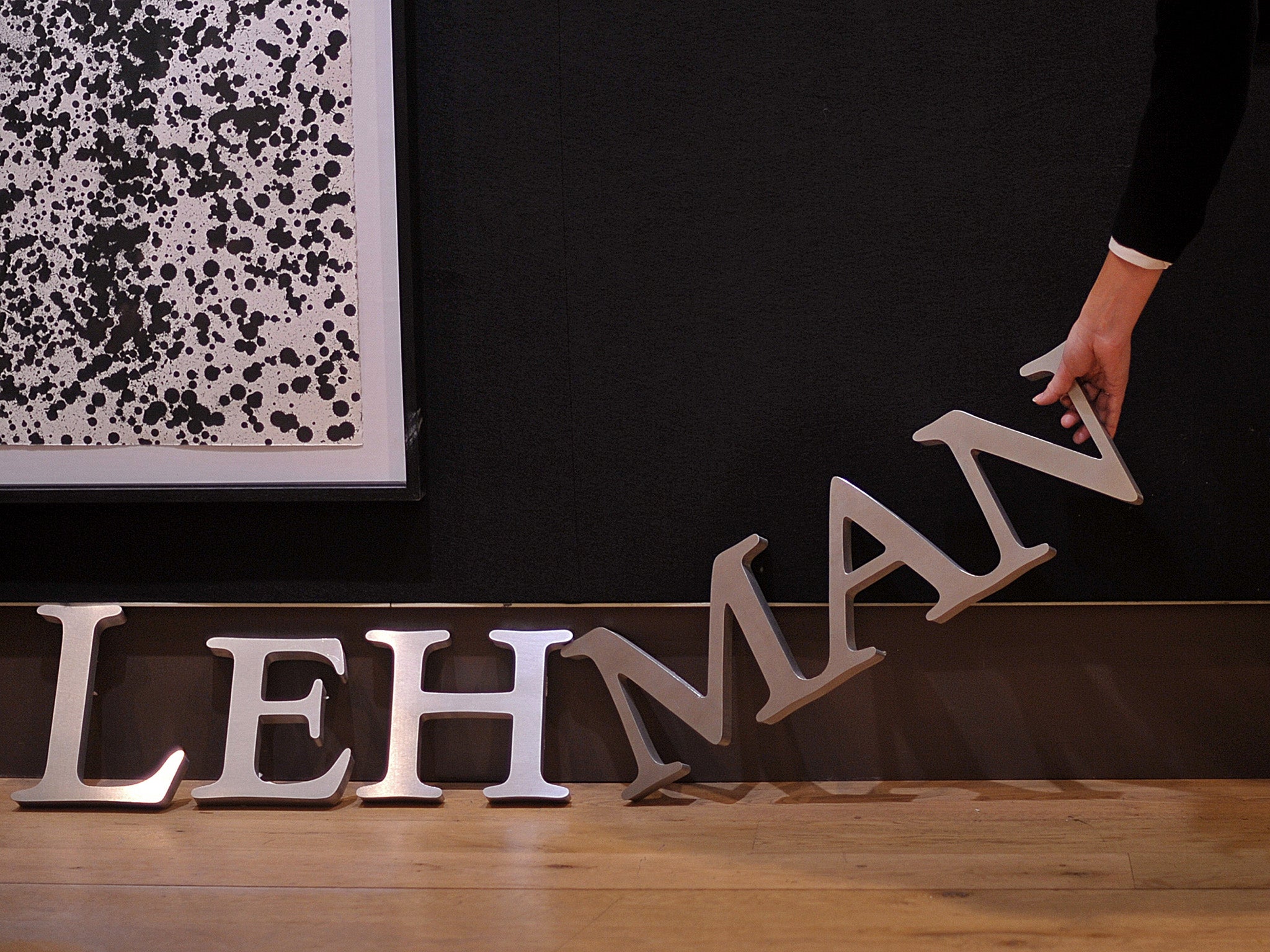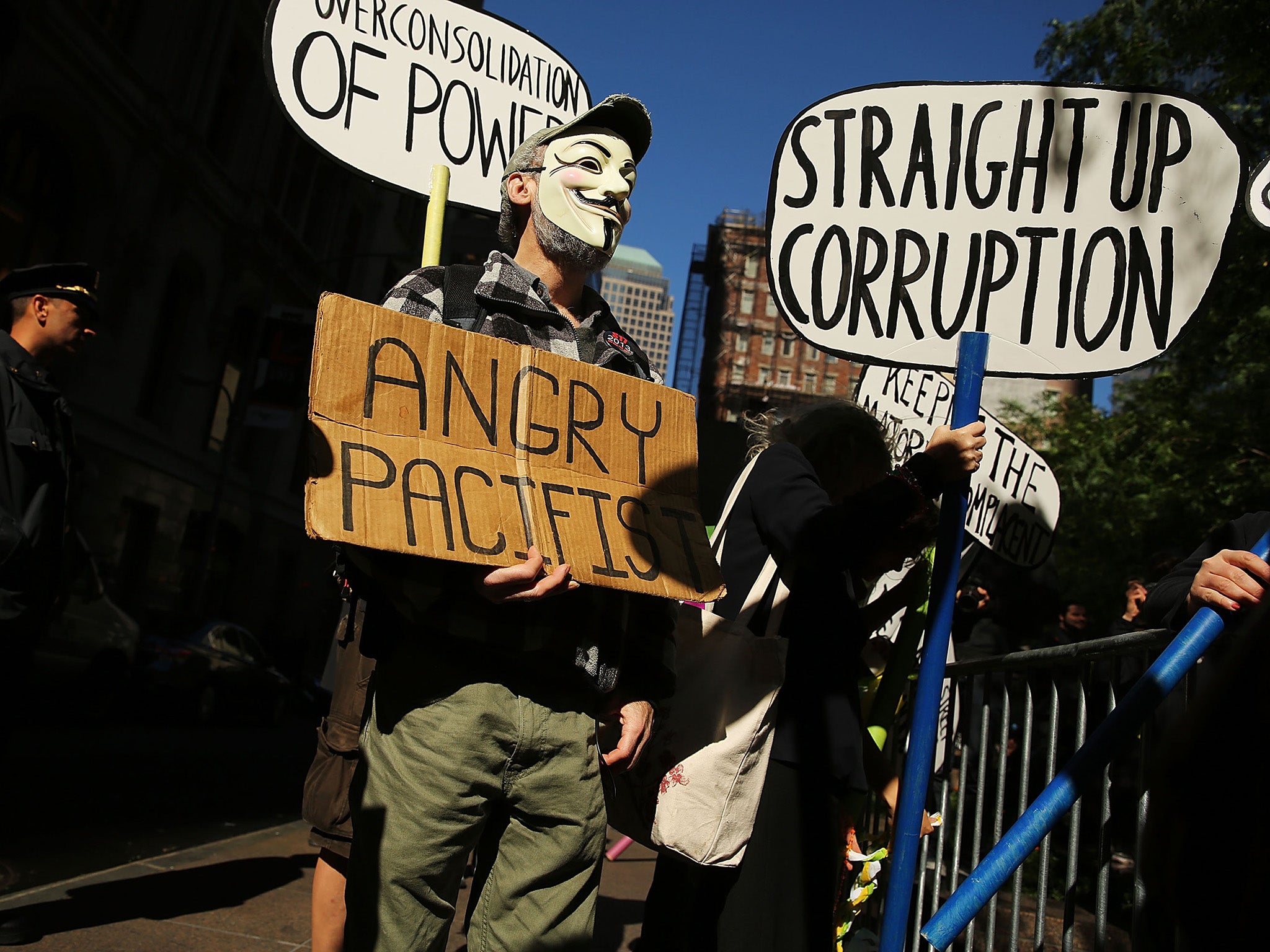Thought the 2008 financial crash was bad? At this rate, there’s worse to come
We're signing our own death warrant putting too much faith in the market in our era of big tech and globalisation. Antara Haldar argues that it doesn't have to be this way


Your support helps us to tell the story
From reproductive rights to climate change to Big Tech, The Independent is on the ground when the story is developing. Whether it's investigating the financials of Elon Musk's pro-Trump PAC or producing our latest documentary, 'The A Word', which shines a light on the American women fighting for reproductive rights, we know how important it is to parse out the facts from the messaging.
At such a critical moment in US history, we need reporters on the ground. Your donation allows us to keep sending journalists to speak to both sides of the story.
The Independent is trusted by Americans across the entire political spectrum. And unlike many other quality news outlets, we choose not to lock Americans out of our reporting and analysis with paywalls. We believe quality journalism should be available to everyone, paid for by those who can afford it.
Your support makes all the difference.It was the economic analogue of 9/11. The moment that changed everything.
Ten years ago this September, the iconic Lehman Brothers was the first domino to fall, setting off the event that has defined the times we live in – the Great Recession. It was like one of those big-studio disaster flicks (so much so that Bond movie director Sam Mendes has turned his attentions to the theme in his new work at London’s National Theatre, The Lehman Trilogy). Cue explosive trailer.
The year is 2008. A few wicked men – let’s call them The Quants – come up with a plan to achieve world domination. They unleash a reign of terror – holding the terrified, helpless masses hostage to their diabolical scheme; threatening their homes, their livelihoods, their savings. It looks like the end is nigh.
Just when we’re all starting to give up hope: enter the hero – the dusky saviour. Tall, dark, handsome and, above all, cool. Oh, and of course, with that baritone – the voice from God. He doesn’t quite screech onto the scene on a motorbike in a studded leather jacket – but almost; yes, indeed – the Harbinger of Hope definitely knows how to make an entrance.
Legislation is enacted. Bailouts are issued. Uplifting speeches are made. Yes we can, indeed. Peace is restored on earth. Or is it?
In the midst of the sound and fury – the heart-wrenching scenes of family homes being foreclosed, the tense images of placard-wielding Occupy protesters in Zuccotti Park, Congressmen making impassioned speeches – in some places, it’s business as usual.
Cut to an image of an innocuous figure somewhere in the echelons of the ivory tower, your average college economics professor: tweedy, bearded – all the loveable, deceptively harmless stereotypes. On a blackboard, he is drawing an all too familiar image: the ever-laconic, bashfully feminine downward sloping demand curve, always yearning for a fillip; and the relentlessly optimistic, thrusting supply curve, gazing north with no upward limit. The two intersecting at the equivalent of the G-spot of economics. The story being told here untouched by the storm raging outside, as disconnected from reality as the blackboard from a smartphone screen.

The pan of the camera in that last scene – its ever so slightly creepy quality – is warning enough. We can almost hear the menacing score in the background. Hollywood has schooled us sufficiently for that. We know we’re witnessing an ember of evil that remains unextinguished by the regulation and political rhetoric – something that can’t be snuffed out by physical force or even bombs: the idea of the economy.
And we know that we’re being set up for a sequel. The financial crisis is merely Act One.
The history of human ideas is so profoundly chequered, so saturated in overt perversion that the competition for the top spot for which one is most evil – the “most dangerous idea in the world”, as Francis Fukuyama puts it – is stiff. Genocide, slavery, colonialism, sexism and nuclear war are all worthy contenders in terms of the misery they are capable of inflicting. But I would argue that there is something just as demonic – that we systematically underestimate.
My answer, ostensibly far more vanilla, underpins – even valourises – the blood-splattered items that usually make the usual “top ten” lists. It’s annihilation without the oomph. A chronic killer, all the more deadly for striking in silence. Far more lethal than media favourites terrorism and cancer put together.
It is the notion of the modern economy.
Economic activity – the proverbial butcher, baker and candlestick maker – has existed for millennia, but for most of that period the relationship between people and things was the right way around. Things existed for people, rather than people for things. It is only as recently as the last century or two that this began to change.
The Industrial Revolution unleashed forces so profoundly powerful that its vortex drew everything – but everything – into it. The world that emerged in its wake was fundamentally different from what had come before, flipping the order of priority so that every other aspect of society became secondary to the organising logic of the economy; all else reduced to grist to the mill of the economic machinery. In his 1944 classic The Great Transformation, the social theorist Karl Polanyi coined a term for this rupture between economy and society: disembedding.
But the roots of the current economic crisis go back to the period immediately after the Second World War. In 1948 a young economist by the name of Paul Samuelson published a textbook called, simply, Economics. The title proved apt: it more or less defined the discipline since its publication. By far one of the most influential thinkers of the 20th century, he went on to become the first American to win the Nobel Prize in economics – and ushered in an era in which America would authoritatively dominate, not only the global economy, but economic thinking. The volume presented a kind of unified field theory for modern economics and did so in what Samuelson emphatically insisted was the subject’s “natural language” – mathematics.
The congealing of consensus in the discipline that quantitative economics was the only game in town came at a price. Samuelson was one of the “good guys” – particularly on account of incorporating into mainstream economic thought the insights of the British economist (once considered a heretic for advocating more government spending when the economy was in a slump), John Maynard Keynes. Nor was he, by any means, the first to liberally deploy mathematics in economics – several before him, including Leon Walras and Alfred Marshall, had done so earlier in the 1900s. But against the backdrop of a world reeling from major tectonic shifts, quantitative economics offered the promise of a seductive certainty that made it central to the reconstruction of the post-war world. If the Industrial Revolution was the technological moment in which the rupture between the economy and society occurred, the methodological shift to the quantitative was the ideological one: the instant in which the intellectual arsenal of the supremacy of the economy became unassailable.
While the tenor of the discourse (that had once boasted a cast of characters like Adam Smith and Karl Marx) in the past had been more overtly political, the new paradigm was based on the notion that mathematical rigour produced politically neutral decisions. Not only was the complexity of political choice obfuscated, but quantitative economics established a monopoly over the conversation – excluding from it both other disciplines (former friends, like sociology, history, politics and philosophy) and ordinary people (whose lives it, ironically, increasingly dictated). Its identification of itself as a science justified – by analogy with the laws of nature – the complete abrogation of moral responsibility: just as an apple does not experience falling as an indignity inflicted by the laws of gravity. The cumulative result was a discipline that was insular and elitist – and imbued with a deep sense of invincibility. The Model was king, and the complexity of reality a footnote to it.
The post-Industrial Revolution economy made the tail-wagging-the-dog logic of things controlling people the norm – but this new mode of economic thought, by invoking the authority of pure science, silenced dissent as simple-minded and elevated it to the status of an unqualified symbol of progress.
If the Industrial Revolution was the prequel to the current economic moment, rest assured that it has a sequel. And that it will be – in Hollywood lingo – “bigger and badder” than what came before. The seismic shifts – globalisation, financialisation and technologisation – associated with what is euphemistically referred to as the “new economy” are poised to make the changes of the past look as incremental as an iPhone upgrade.
The Uber-Amazon-Airbnb-Tinder economy has changed how we travel and shop, live and love. Tech titans like Google, Facebook and Twitter have now become instrumental to how we vote – and how we think. That’s to say nothing of the developments in AI and genetics that are on the cusp of catapulting us into the dystopian future that was once the exclusive preserve of sci-fi.

If the manufacturing economy was the Frankenstein’s monster to human society’s Dr Frankenstein, the forces of technologisation are the equivalent of Godzilla – comparable to the shift from cavalry to chemical warfare. And, to the extent that the forces of, for instance, artificial intelligence, genetic engineering and climate change represent existential threats of a kind that we have never encountered before, history may not, this time, even have the luxury of repeating itself.
To trust our destiny to the tyranny of The Model – a regime “of the 1 per cent, by the 1 per cent, for the 1 per cent”, to borrow a phrase coined by my co-author, Nobel prize winner in economics, Joseph Stiglitz – is to willingly sign our collective death warrant. The seemingly inoffensive corduroy-clad economics professor from Scene One of our story is to The Model what Oppenheimer was to the Manhattan Project – without him there would have been no device for The Quants to detonate. Far from the trickle-down advertised on the tin, the financial crisis has revealed the current economic system to be a can of worms devoted to funnelling up. The system is broken. By design. How much more evidence do we need? The explanation lies not just in the usual suspects that are vilified – the greedy bankers and corrupt politicians – but, even more fundamentally, the hubris of economic theory. If the current rubric could have nearly burnt the world to cinders tweaking algorithms for the derivatives market, can you imagine what they can do with the combined power of robotics and eugenics?
Polanyi’s prophesy was that this upside-down world order – in which monopoly money was real and people reduced to human chessmen at its will – could not endure. That the homogenising zeal of the modern economy, eviscerating labour, land and money was not only wrong, but unsustainable. And all the evidence suggests that this scenario is playing out. As we live more and more in the digital realm and less and less in the physical, the epidemic of alienation is exacerbated – undermining the only things (government, community, the collective contract) that might have the power to rein in the forces at play.
If populism is the primal scream that society is emitting in response to the financial crisis, obliteration will be the product of allowing the system to carry on. Injustice – and ultimate destruction – are written into the flowchart of our current economic system.
In a culture increasingly, and admirably, committed to standing up to structural injustice on various axes with righteous indignation – gender, race, ethnicity – the discourse on inequality still speaks in a relatively meek voice. The 99 per cent, predictably losers in the economic lottery, continue to harbour a sneaking suspicion that it’s somehow their fault that they didn’t make the cut – that they may legitimately have missed out on merit. Economic theory nods encouragingly on.
And this is where the solution lies. There is a line from the Preamble of the Constitution of UNESCO that has stayed with me: “Since war begins in the minds of men,” it goes, “it is in the minds of men that the defences of peace must be constructed.” Every piece of the intricate latticework of human civilisation started with an idea. This is the defining feature of the Anthropocene; the essential hubris of humankind – the capacity to think our way into an alternative reality.

And, so, because we made it, we can change it.
A few weeks ago, I was invited to give a talk at Oxford. I was buoyed to see a group of bright-eyed, bushy-tailed undergraduates gathered, especially on a Friday night. The topic was “radicalising the curriculum”. The very “woke” students thought I would talk about race, or, if I was feeling eclectic, gender. As I started my talk, I could see some uncomfortable shuffling: what was the trouble, I thought? Was I being seen as a traitor to the cause, a sell-out for buying into the all-encompassing logic of economics?
The problem, I found out afterwards, was different: many in the audience (historians and sociologists, philosophers and biologists) were alienated by my use of the term “neoclassical economics”. How deeply ironic that these young adults, some of the best and brightest in the country, whose economic futures will be determined by this system of belief – who will never own homes and have their “avocado habit” blamed for it – can’t even name the ideas that serve as the blueprint for their world. After some coaxing the students – especially the politically invested (who, like me, were often made to feel embarrassed for this trait) – admitted that they were driven away from economics by the maths.
The methodological penis envy of economics has led to a field that is closed to a degree that has made the subject almost Masonic. But economics, as a discipline, is failing even on its own terms – as a predictive science. In the last few decades, it has not only missed the story of the biggest financial crisis since the Great Depression, but also been hard pressed to explain other major global events, such as the rise of the economies of the Global South, such as India’s and, particularly, China’s.
But it isn’t all doom and gloom: to borrow the tag line of the World Social Forum, another world truly is possible. Most importantly in the realm of ideas. The work of Nobel prize winning psychologist Daniel Kahneman, together with legal scholar Cass Sunstein and fellow Nobel laureate in economics Richard Thaler, could fundamentally shift our understanding of the protagonist at the heart of the economy. Their work has helped replace the sociopathic hyper-materialistic rational actor that has been at the centre of economic analysis for centuries – known as homo economicus – with a better fleshed out, more human account. Developments in behavioural economics – drawing on the breakthroughs in the cognitive sciences, particularly moral psychology – are establishing that human beings are not entirely selfish and respond to non-material incentives.
The work of Stiglitz on asymmetric information picks a gaping hole in the notion of perfect markets. The only woman Nobel laureate in economics, Elinor Ostrom, demonstrated the importance of community-based solutions to market problems. Amartya Sen’s work on the inversion of means-ends reasoning in economics has been crucial: is the bicycle important, as Sen asks, or what a person can do with it? The Nobel archives curate – and reward – an endless array of contributions to a field that disproves many of the central tenets of economic theory; yet, in the face of wave upon wave of assault, neoclassicism – like the Trump presidency – seems to emerge virtually unscathed.
The challenge, then, is to join the dots between these individual breakthroughs to construct a genuinely new paradigm. Building what I call the “three Cs” into economics – cognition, context, and most importantly community – will go a long way towards making economics a more socially accountable discipline. But, ultimately, it will have to be a matter of putting ethics before economics.
The current mode of economic thought – neoclassicism – is not the only possible one. Nor has it been in place since the beginning of time. The notion of choosing to set aside market logic is not as radical or old-fashioned as it seems. We do it all the time. It’s the reason that we don’t pay our romantic partners for sex, hire friends to invite to dinner parties or lease out parts of our anatomy as billboards.
We need, following Polanyi, to re-embed – in humanity, and in the humanities.
Martin Luther King – as often quoted by Barack Obama – was fond of saying, “The arc of the moral universe is long, but it bends towards justice.” But we are the ones tracing out that line. We hold the pencil in our hands. But before the world can change, our ideas about it need to change. Otherwise we are complicit in accepting the system. Saying that the monster that is the market must control man is like saying that the invention of the atom bomb makes nuclear war inevitable. Markets and morals are not mutually exclusive.
Antara Haldar is a fellow of Peterhouse and lecturer in law and economics at the University of Cambridge and is currently visiting faculty at Harvard
Join our commenting forum
Join thought-provoking conversations, follow other Independent readers and see their replies
Comments